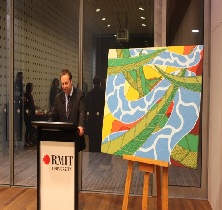JUDD, Barry
 Degree
Degree
Bachelor of Arts
Graduation year
1991
Current position
Professor, Indigenous Studies
Employer
RMIT University
What are some of your career highlights?
- Successfully bidding for two ARC (Australian Research Council) grants that enable me to be an active researcher within the field of Indigenous Studies. The opportunity to travel extensively within and outside Australia and meet others with similar passions for Indigenous focussed research. Perhaps the most memorable highlight was an opportunity to speak at the International Cricket Council (ICC) Centenary Conference held at Oxford University and to be approached by Clive Lloyd, former West Indies cricket captain at morning tea. Having Mr. Lloyd agree with some of what I said about racism in Australia and chatting over tea and scones was priceless!
- Another highlight would be going on to postgraduate studies and to complete several qualifications at the University of Melbourne and Monash University.
- The opportunity to publish and inform debate on Indigenous issues is always something I consider a highlight of my career.
What are your strongest memories while you were studying at the University?
COLD! The Horror of the COLD! Going to several gigs by the folk band Redgum where only 30-40 others would turn up. The best pasties I ever had were sold on campus. Dr. Janice Newton who lectured me in sociology. She was one of those important teachers who can change the whole direction of your life. She encouraged me to use my university studies to investigate Australian history from Indigenous perspectives. She made me aware of an Indigenous cadetship program at The University of Melbourne (Ballarat was then Ballarat University College and part of Melbourne). That was my first job and I've been in the higher education sector ever since.
Describe the most enjoyable and challenging aspects of your job
Combining my personal interest in sport with my research interests is a huge positive and has been essential to a happy and productive working life. Travel is another highlight. I think a challenge remains how to engage non-Indigenous students with Indigenous perspectives on history and society when many of them just don't want to hear it. It's a pretty tough gig sometimes when you are outlining the history of the stolen generations to 150 plus students all wanting to save the world by getting a degree in social work!
Another challenge is the cultural incompetence of 'mainstream' organisations in Australia. They have no idea about Indigenous Australia and largely don't see why Aboriginal and Torres Strait Islander peoples matter. It's therefore often a huge struggle within the higher education sector to get Indigenous Education and Employment and Indigenous Studies on the agenda and keep it front and centre. Moving beyond most peoples' concept of Indigenous issues as welfare issues one in which the inclusion of Indigenous people is see as value adding to the core business of learning and teaching and research is a daily grind. But hey someone has to fight this battle.
Do you have any advice about life after study to pass on to current students?
Education at whatever level can transform your life and in small ways free you. I cannot image a world without books and ideas and the ability to communicate my ideas with others. I'd encourage all current and future students to take education seriously – as an act of personal self-determination. The things you achieve today will have huge and positive consequences for your family and your community in the future.
In one sentence what words of wisdom would you pass on to students
Never ever give up!